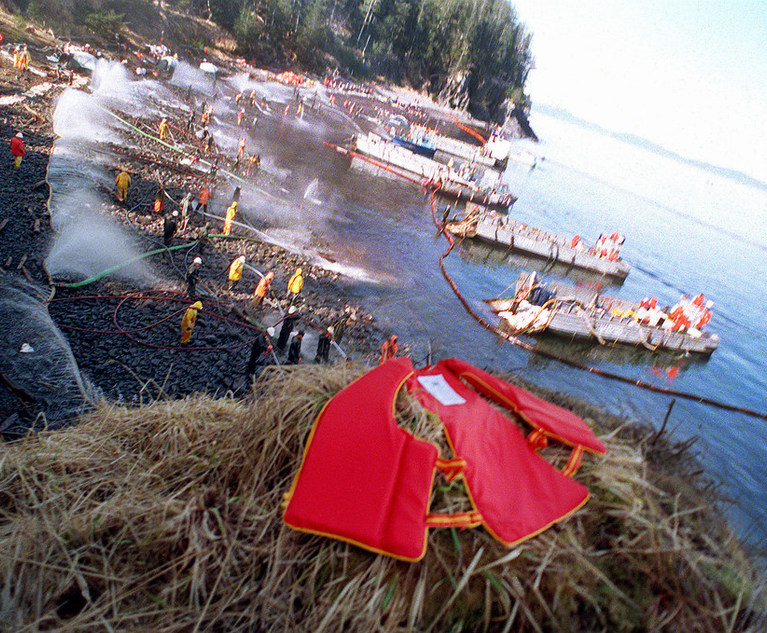 U.S. Navy Mechanized Landing Craft anchored along the shoreline as Navy and civilian personnel position hoses during oil cleanup efforts on Smith Island after the Exxon Valdez oil spill. Photo: PH2 Poche via Wikipedia.
U.S. Navy Mechanized Landing Craft anchored along the shoreline as Navy and civilian personnel position hoses during oil cleanup efforts on Smith Island after the Exxon Valdez oil spill. Photo: PH2 Poche via Wikipedia. The Years of Magic(al) Pipe Thinking
Years of magic(al) pipe thinking have deluded perpetrators into believing they can continue to intentionally pump oil into the world's oceans with impunity, says Keith B. Letourneau, a partner with Blank Rome.
June 21, 2022 at 06:29 PM
6 minute read
AnalysisFollowing the Exxon Valdez pollution disaster in Alaska in 1989, Congress enacted the Oil Pollution Act of 1990 (OPA) to deter future discharges by requiring the gradual phasing in of double-hulled vessels to carry oil and implementing a strict-liability regime that imposed liability on the "responsible party," that is, either the vessel or facility from which the spill originated. Congress also ratcheted up the potential sanctions to include potential unlimited liability for removal costs and damages, and criminal liability exposure for the negligent discharge of oil into navigable waters eliminating the need to prove up any mens rea (criminal intent). OPA has had an incredibly beneficent effect on the number and volume of oil discharges from vessels in U.S. waters, drastically reducing both (the number of annual incidents has fallen from 6,000 in 2002 to less than 3,000 in 2016, and the volume has plummeted to well less than 500,000 gallons annually, save for the catastrophic 2010 Deepwater Horizon disaster; before 1990, annual average oil spilled ranged between 10 million and 20 million gallons).
Yet, smaller but pernicious intentional discharges continue to occur worldwide when engineers aboard ships bypass the installed oil-water separator (OWS) and discharge oily water directly over the side. To combat such discharges, Congress included in the Act to Prevent Pollution from Ships (APPS) a whistleblower provision that permits the court to award up to half of any fine paid for APPS violations to any person providing information to the U.S. Coast Guard that leads to a conviction. With the advent of smartphones to visually record and transmit evidence of installed so-called magic pipes used to bypass the OWS, the Coast Guard continues to investigate numerous incidents, referring cases to the U.S. Department of Justice's Environmental Crimes Section when facts warrant, and the DOJ then pursues criminal-enforcement action.
This content has been archived. It is available through our partners, LexisNexis® and Bloomberg Law.
To view this content, please continue to their sites.
Not a Lexis Subscriber?
Subscribe Now
Not a Bloomberg Law Subscriber?
Subscribe Now
NOT FOR REPRINT
© 2025 ALM Global, LLC, All Rights Reserved. Request academic re-use from www.copyright.com. All other uses, submit a request to [email protected]. For more information visit Asset & Logo Licensing.
You Might Like
View All
Are Counsel Ranks Getting 'Squeezed' as Nonequity and Associate Pay Grows?
5 minute read

Deal Watch: Private Equity Dealmakers Make 2025 Predictions Amid Deal Resurgence
12 minute read
Law Firms Mentioned
Trending Stories
- 1Who Are the Judges Assigned to Challenges to Trump’s Birthright Citizenship Order?
- 2Litigators of the Week: A Directed Verdict Win for Cisco in a West Texas Patent Case
- 3Litigator of the Week Runners-Up and Shout-Outs
- 4Womble Bond Becomes First Firm in UK to Roll Out AI Tool Firmwide
- 5Will a Market Dominated by Small- to Mid-Cap Deals Give Rise to a Dark Horse US Firm in China?
Who Got The Work
J. Brugh Lower of Gibbons has entered an appearance for industrial equipment supplier Devco Corporation in a pending trademark infringement lawsuit. The suit, accusing the defendant of selling knock-off Graco products, was filed Dec. 18 in New Jersey District Court by Rivkin Radler on behalf of Graco Inc. and Graco Minnesota. The case, assigned to U.S. District Judge Zahid N. Quraishi, is 3:24-cv-11294, Graco Inc. et al v. Devco Corporation.
Who Got The Work
Rebecca Maller-Stein and Kent A. Yalowitz of Arnold & Porter Kaye Scholer have entered their appearances for Hanaco Venture Capital and its executives, Lior Prosor and David Frankel, in a pending securities lawsuit. The action, filed on Dec. 24 in New York Southern District Court by Zell, Aron & Co. on behalf of Goldeneye Advisors, accuses the defendants of negligently and fraudulently managing the plaintiff's $1 million investment. The case, assigned to U.S. District Judge Vernon S. Broderick, is 1:24-cv-09918, Goldeneye Advisors, LLC v. Hanaco Venture Capital, Ltd. et al.
Who Got The Work
Attorneys from A&O Shearman has stepped in as defense counsel for Toronto-Dominion Bank and other defendants in a pending securities class action. The suit, filed Dec. 11 in New York Southern District Court by Bleichmar Fonti & Auld, accuses the defendants of concealing the bank's 'pervasive' deficiencies in regards to its compliance with the Bank Secrecy Act and the quality of its anti-money laundering controls. The case, assigned to U.S. District Judge Arun Subramanian, is 1:24-cv-09445, Gonzalez v. The Toronto-Dominion Bank et al.
Who Got The Work
Crown Castle International, a Pennsylvania company providing shared communications infrastructure, has turned to Luke D. Wolf of Gordon Rees Scully Mansukhani to fend off a pending breach-of-contract lawsuit. The court action, filed Nov. 25 in Michigan Eastern District Court by Hooper Hathaway PC on behalf of The Town Residences LLC, accuses Crown Castle of failing to transfer approximately $30,000 in utility payments from T-Mobile in breach of a roof-top lease and assignment agreement. The case, assigned to U.S. District Judge Susan K. Declercq, is 2:24-cv-13131, The Town Residences LLC v. T-Mobile US, Inc. et al.
Who Got The Work
Wilfred P. Coronato and Daniel M. Schwartz of McCarter & English have stepped in as defense counsel to Electrolux Home Products Inc. in a pending product liability lawsuit. The court action, filed Nov. 26 in New York Eastern District Court by Poulos Lopiccolo PC and Nagel Rice LLP on behalf of David Stern, alleges that the defendant's refrigerators’ drawers and shelving repeatedly break and fall apart within months after purchase. The case, assigned to U.S. District Judge Joan M. Azrack, is 2:24-cv-08204, Stern v. Electrolux Home Products, Inc.
Featured Firms
Law Offices of Gary Martin Hays & Associates, P.C.
(470) 294-1674
Law Offices of Mark E. Salomone
(857) 444-6468
Smith & Hassler
(713) 739-1250






